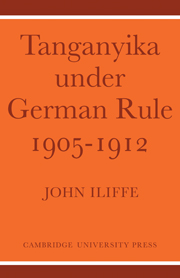Book contents
- Frontmatter
- Contents
- Preface
- Terminology
- Abbreviations
- Glossary
- Map of Tanganyika in 1912
- 1 The argument
- 2 The Maji Maji rebellion
- 3 The political context
- 4 Rechenberg and reconstruction
- 5 The European challenge
- 6 White man's country
- 7 The collapse of the local compromise
- 8 The age of improvement
- 9 The new dilemma
- Bibliography
- Index
4 - Rechenberg and reconstruction
Published online by Cambridge University Press: 04 August 2010
- Frontmatter
- Contents
- Preface
- Terminology
- Abbreviations
- Glossary
- Map of Tanganyika in 1912
- 1 The argument
- 2 The Maji Maji rebellion
- 3 The political context
- 4 Rechenberg and reconstruction
- 5 The European challenge
- 6 White man's country
- 7 The collapse of the local compromise
- 8 The age of improvement
- 9 The new dilemma
- Bibliography
- Index
Summary
Dernburg's term of office as Colonial Secretary was an era of genuine reform. Many abuses were eradicated, the administrative and financial structure was rationalised, and Germany's commitment to its overseas empire was greatly increased. Nevertheless, it is wrong to confuse administrative reform with liberal aims. The accepted view assumes that because this period saw the end of gross inequities it conferred great benefits on Germany's African subjects. The fact that Germany at last had a competent and well-intentioned Colonial Secretary, it is argued, was of itself an advantage to the inhabitants of the colonies. This confusion is quickly dispelled by a reference to the ‘era of reform’ in South-West Africa. Efficient and purposeful administration was certainly established there during this period. Its energies, however, were directed towards creating a colony under the absolute control of its European inhabitants. In 1913, writes Dr Bley, ‘the subjugation of the Africans and their exploitation as a labouring class remained the basis of German policy in South-West Africa. Its primary objective was to enable the German settlers to consolidate their position… The act of self-government, the educational policy and the land policy were all subordinated to the primary objective of consolidating the German settlers’. ‘Reform’ in South-West Africa meant a hardening rather than a liberalisation of German policy.
- Type
- Chapter
- Information
- Tanganyika Under German Rule 1905–1912 , pp. 49 - 81Publisher: Cambridge University PressPrint publication year: 1969



